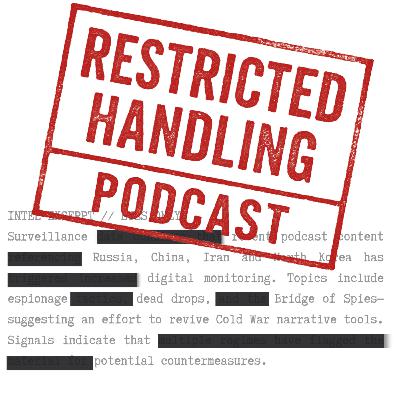RH 11.21.25 | China: Shadow Navy, Spy Ships & Canceled Concerts
Description
Strap in—today’s episode of The Restricted Handling Podcast dives headfirst into the storm that is modern China’s global playbook. From war drills to jazz bans, the world’s second-largest power is flexing, fuming, and fine-tuning every lever of influence it’s got.
We start at sea, where China’s so-called “shadow navy” of civilian ferries and cargo ships is back in motion. These aren’t harmless freight carriers—they’re practicing how to unload military vehicles straight onto beaches. Think D-Day logistics, but commercial. It’s part of Beijing’s ever-tightening rehearsal for a Taiwan invasion, where the line between “training” and “preparation” has become paper-thin. Taiwan’s watching every move, and the U.S. isn’t blinking either—especially as a Chinese spy ship was spotted tailing the Quad’s Malabar exercises near Guam.
Meanwhile, the Beijing–Tokyo standoff has gone full Cold War energy. Remember Prime Minister Sanae Takaichi’s comment about defending Taiwan? That spark just lit a diplomatic bonfire. China’s now canceled every Japanese concert for the rest of the year, booted cruise lines out of Japanese ports, and redirected thousands of tourists to South Korea instead. It’s part boycott, part flex, and part economic body slam. South Korea’s loving the influx, Japan’s tourism industry… not so much.
The spy games keep coming, too. MI5’s warning about Chinese LinkedIn recruiters—those “consultants” offering secret gigs to British officials—just went from rumor to reality. Now it’s a full-blown investigation targeting fake headhunters posing as research firms. Across the pond, U.S. officials are tracking Chinese underground banks laundering over $150 billion a year for everyone from Mexican cartels to North Korean hackers. One suspect in Cambodia, Chen Zhi, is accused of washing billions in crypto through fake real estate deals—complete with links to Pyongyang’s cyber thieves.
On the tech front, the semiconductor showdown is heating up again. Four people have been indicted for smuggling Nvidia’s most advanced AI chips into China, and Congress is hitting back with new chip-tracking and export laws. Taiwan’s Foxconn, meanwhile, is building a $1.4 billion supercomputing center with Nvidia that’ll run the next-gen Blackwell GB300 GPUs. It’s the new front line in the AI arms race—and it’s right in the middle of the crossfire.
Then there’s Beijing’s hybrid war: hackers hijacking software updates to push malware, while AI-generated propaganda floods social media in Indonesia, painting China as an ancient Islamic ally. It’s historical fiction meets geopolitical psy-ops.







